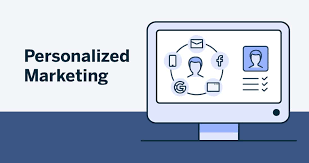Personalized marketing campaigns have become increasingly essential in today’s competitive landscape, enabling businesses to connect with customers on a deeper level and deliver tailored experiences that resonate with their needs and preferences. By leveraging data-driven insights and advanced technology, marketers can create highly targeted and effective campaigns that drive engagement, loyalty, and conversions. In this article, we’ll explore strategies for personalized marketing campaigns to help businesses effectively reach and engage their target audience.
1. Data Collection and Analysis
The foundation of personalized marketing campaigns lies in data collection and analysis. Marketers need to gather relevant data about their target audience, including demographics, behaviors, preferences, and purchase history. By leveraging data analytics tools and customer relationship management (CRM) systems, marketers can gain valuable insights into customer preferences, identify patterns, and segment their audience effectively for personalized targeting.
2. Segmentation and Targeting
Segmentation is key to personalized marketing campaigns, as it allows marketers to divide their audience into distinct groups based on shared characteristics or behaviors. By segmenting their audience, marketers can create highly targeted campaigns tailored to the specific needs and interests of each segment. This could include demographic segmentation, such as age or location, or behavioral segmentation, such as past purchase behavior or engagement with previous campaigns.
3. Personalized Content Creation
Once the audience segments are identified, marketers can create personalized content that speaks directly to the interests and needs of each segment. This could involve customizing messaging, imagery, offers, and calls-to-action based on the preferences and behaviors of the target audience. Personalized content can help increase engagement, drive conversions, and foster stronger connections with customers.
4. Dynamic Email Marketing
Email marketing remains a powerful tool for personalized communication with customers. By leveraging dynamic content and personalization tags, marketers can create highly relevant and engaging email campaigns that resonate with individual recipients. This could include personalized product recommendations, tailored promotions, or targeted messaging based on previous interactions or purchase history.
5. Behavioral Trigger Campaigns
Behavioral trigger campaigns are automated marketing campaigns that are triggered by specific actions or behaviors taken by customers. These triggers could include actions such as website visits, email opens, or abandoned carts. By setting up trigger-based campaigns, marketers can deliver timely and relevant messages to customers at key moments in their journey, increasing the likelihood of conversion and driving engagement.
6. Retargeting and Remarketing
Retargeting and remarketing campaigns allow marketers to re-engage customers who have previously interacted with their brand but have not yet made a purchase. By tracking user behavior across channels and devices, marketers can deliver personalized ads or messages to remind customers of products they viewed or abandoned in their shopping cart. This helps keep the brand top-of-mind and encourages customers to complete their purchase.
7. AI and Machine Learning
Artificial intelligence (AI) and machine learning technologies are increasingly being used to enhance personalized marketing campaigns. These technologies can analyze vast amounts of data, predict customer behavior, and recommend personalized content or offers in real-time. By leveraging AI-driven insights, marketers can optimize their campaigns for maximum effectiveness and deliver truly personalized experiences to each customer.
8. Continuous Testing and Optimization
Finally, continuous testing and optimization are essential for the success of personalized marketing campaigns. Marketers should regularly monitor campaign performance, analyze results, and iterate on their strategies based on insights gained. By testing different messaging, offers, and targeting strategies, marketers can identify what resonates most with their audience and continuously improve the effectiveness of their campaigns.
Conclusion
In conclusion, personalized marketing campaigns offer businesses a powerful way to connect with customers on a deeper level and drive meaningful engagement and conversions. By leveraging data-driven insights, segmentation, personalized content creation, dynamic email marketing, behavioral trigger campaigns, retargeting and remarketing, AI and machine learning, and continuous testing and optimization, marketers can create highly targeted and effective campaigns that deliver personalized experiences to each customer, ultimately driving business growth and success.
FAQs
What is personalized marketing?
Personalized marketing involves creating tailored marketing campaigns and content that are specifically designed to resonate with individual customers based on their preferences, behaviors, and past interactions with the brand.
Why are personalized marketing campaigns important?
Personalized marketing campaigns are important because they allow businesses to connect with customers on a deeper level, drive engagement and loyalty, and ultimately increase conversions and sales by delivering highly relevant and targeted messages and offers.
How can businesses collect data for personalized marketing campaigns?
Businesses can collect data for personalized marketing campaigns through various channels, including website analytics, social media insights, email marketing metrics, customer surveys, and CRM systems.
What are some examples of personalized marketing campaigns?
Examples of personalized marketing campaigns include personalized email marketing, dynamic website content, targeted social media advertising, personalized product recommendations, and behavior-based trigger campaigns.
What role does technology play in personalized marketing campaigns?
Technology, such as data analytics tools, CRM systems, AI, and machine learning, plays a crucial role in personalized marketing campaigns by enabling businesses to collect, analyze, and leverage customer data to deliver highly targeted and effective campaigns.







